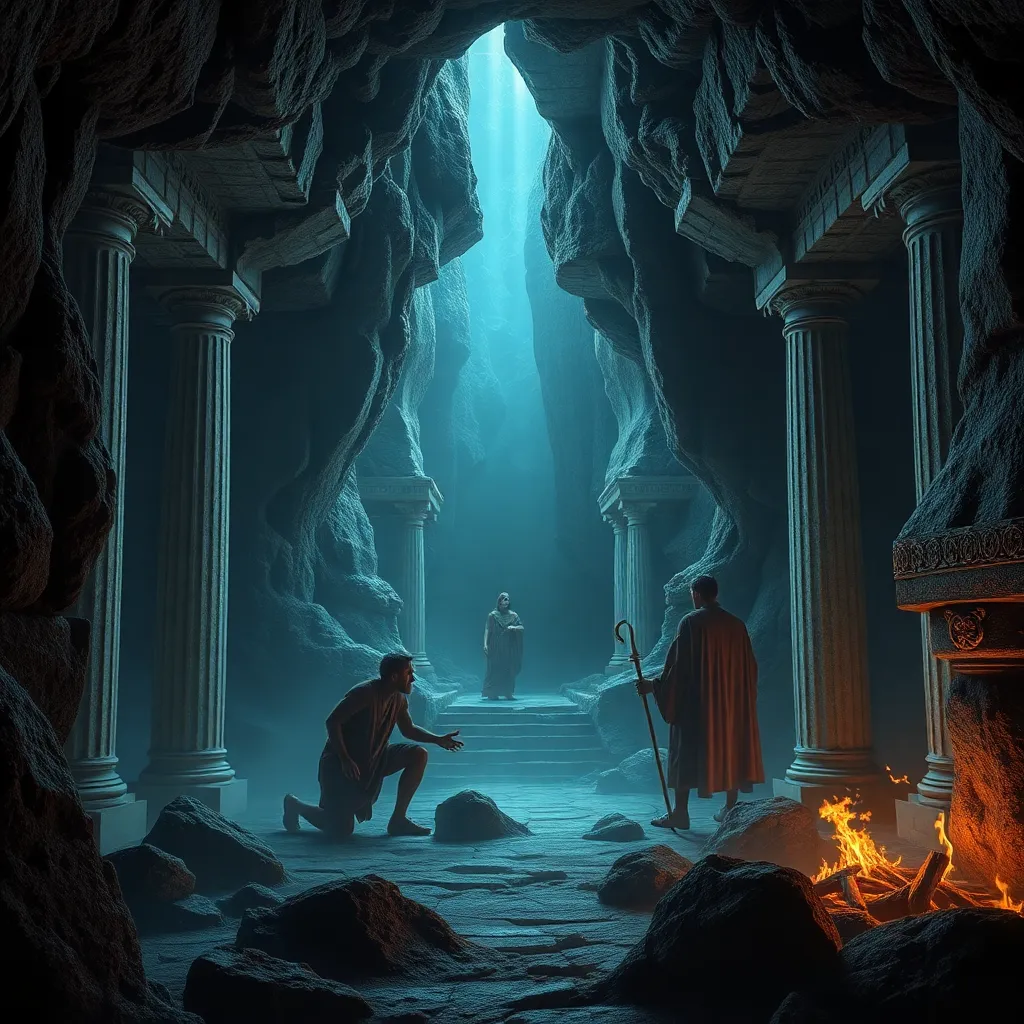The Underworld and the Concept of Evil in Greek Mythology
I. Introduction
Greek mythology is a rich tapestry of stories that have influenced Western culture for centuries. It encompasses a wide array of deities, heroes, and mythical creatures, each representing different aspects of life, nature, and human emotion. Among the most compelling themes in Greek mythology is the concept of the Underworld, a realm that not only serves as the final resting place for souls but also reflects the complexities of morality and evil.
The Underworld plays a central role in Greek beliefs, acting as a significant counterpoint to the world of the living. It is depicted as a mysterious and often frightening place where souls journey after death. Within this context, the concept of evil emerges, characterized by both moral failings and natural misfortunes that befall mortals.
II. The Structure of the Underworld
The Underworld is intricately structured, comprising various regions that cater to the different fates of souls. The three primary sections are:
- Tartarus: A deep abyss used as a dungeon of torment for the wicked, where the most heinous offenders face eternal punishment.
- Elysium: A paradise reserved for the virtuous and heroic, where souls enjoy eternal bliss.
- The Asphodel Meadows: A neutral zone for those who lived average lives, where souls wander in a state of forgetfulness.
Key figures associated with the Underworld include:
- Hades: The ruler of the Underworld, who oversees the realm and ensures the balance of souls.
- Persephone: The queen of the Underworld, who spends half of the year with Hades and the other half with her mother, Demeter.
- Charon: The ferryman who transports souls across the river Styx, charging a fee often depicted as an obol, a coin placed in the mouth of the deceased.
The journey of the soul after death is a significant theme in Greek mythology. Upon death, the soul is guided by Charon to the Underworld, where it faces judgment based on its deeds in life. This judgment determines the soul’s ultimate destination, whether it be in Tartarus, Elysium, or the Asphodel Meadows.
III. The Concept of Evil in Greek Mythology
In Greek mythology, evil is categorized into two primary types: moral evil and natural evil. Moral evil refers to actions taken by individuals that cause harm or suffering, while natural evil encompasses the suffering caused by natural disasters and misfortunes.
The gods and goddesses in Greek mythology play a vital role in the dynamics of good and evil. Some deities, such as Zeus and Athena, promote justice and order, while others, like Eris (the goddess of discord), embody chaos and strife. Myths often illustrate the struggle between good and evil, with heroes facing trials that test their moral fiber and resolve.
IV. The Role of Hades
Hades, the god of the Underworld, is often misunderstood as purely evil. In reality, his role is more complex. He governs the realm of the dead, ensuring that souls receive their due based on their earthly lives. Contrary to popular belief, Hades does not actively inflict evil; rather, he maintains order among the dead.
Hades’ relationships with other gods and mortals are also noteworthy. He is often depicted as stern but fair, and his bond with Persephone adds a layer of depth to his character. This relationship illustrates themes of love, loss, and the cyclical nature of life and death.
V. The Punishments of the Damned
Within Tartarus, many souls face infamous punishments that serve as cautionary tales. Some of the most notable figures include:
- Sisyphus: Condemned to eternally roll a boulder up a hill, only for it to roll back down each time he reaches the top.
- Tantalus: Tormented by hunger and thirst, standing in a pool of water that recedes whenever he tries to drink and under branches of fruit that elude his grasp.
These punishments highlight the significance of moral failing and serve as a reminder of the consequences of one’s actions. The fables of the damned impart valuable lessons about the nature of evil and the importance of virtue.
VI. The Elysian Fields: A Contrast to Evil
In stark contrast to the torments of Tartarus, the Elysian Fields represent a paradise for the virtuous. Here, souls who lived righteous lives are rewarded with eternal happiness, engaging in pursuits of joy and peace.
The significance of these rewards illustrates the Greek belief in moral behavior as a determinant of one’s fate after death. The duality of the Underworld, encompassing both reward and punishment, emphasizes the moral framework that guided ancient Greek society.
VII. Cultural Impact of the Underworld and Evil Concepts
The Underworld and its associated concepts of evil have left a lasting impact on art, literature, and philosophy throughout history. From ancient plays by playwrights like Aeschylus and Sophocles to modern interpretations in literature and film, the themes of good versus evil continue to resonate.
In comparing Greek mythology with other mythologies, one finds both similarities and differences in the views of the afterlife and evil. For example, while many cultures have a concept of judgment after death, the Greek notion of a structured Underworld with distinct regions is uniquely elaborate.
The legacy of Greek mythology persists in contemporary culture, often shaping modern interpretations of evil, morality, and the human condition.
VIII. Conclusion
In summary, the Underworld holds a significant place in Greek mythology, embodying the complexities of life, death, and morality. The concept of evil, both in its moral and natural forms, plays a crucial role in understanding the narratives and characters that populate these ancient stories.
These myths reflect the ancient Greeks’ perceptions of human nature and the moral dilemmas faced in life. As we delve into these timeless tales, we uncover insights that remain relevant in our understanding of good, evil, and the eternal quest for meaning in the human experience.




